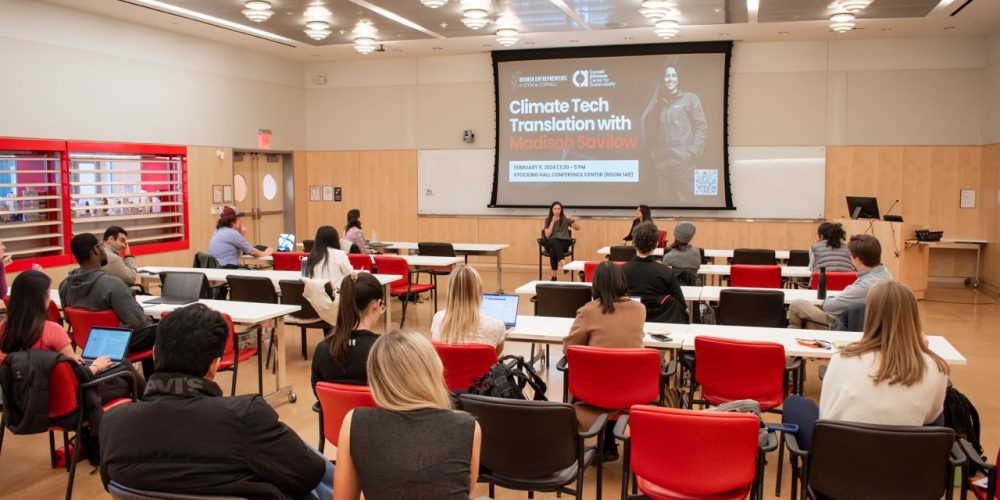For innovators looking to make an impact with their climate technology research, entrepreneurship is a powerful tool. Climate tech startups like the carbon utilization company Carbon Upcycling advance climate solutions while creating jobs, stimulating the economy and improving industries.
At an event this month co-hosted by W.E. Cornell and the Cornell Atkinson Center for Sustainability, Madison Savilow, Chief of Staff at Carbon Upcycling, shared her insights on this burgeoning industry in a fireside chat with Andrea Ippolito ’06, M.Eng. ’07, Director of W.E. Cornell and founder of SimpliFed.
Savilow joined Carbon Upcycling part time during her final year at the University of Calgary. She was looking for a laid-back job and instead found herself in the fast-paced environment of a startup. She joined the company full time after graduation.
“I just fell in love with it right away,” she said. “I think for me, it was the fact that we weren’t just building a startup, we were building an industry, because carbon utilization was so new.”
Valued at more than $34 million, Carbon Upcycling’s technology transforms carbon dioxide, industrial waste and natural materials to produce improved materials, with a focus on cement. Although the technology has other applications, mentors advised the team to narrow their focus to a specific sector.
“A startup should be really mission-driven to accomplish something, not 10 somethings,” Savilow said.
Carbon Upcycling honed in on cement and concrete because of the strength of their cement product and the size of the industry — concrete is the most-used manufactured substance on Earth.
“We found that we had this unique advantage in the performance of our material as a replacement for cement in concrete,” she said. “It increases the compressive strength of the concrete by 40% and results in concrete that’s up to 60% lower carbon.”
Savilow emphasized the importance of offering an effective and environmentally friendly product with multiple advantages compared to alternatives.
“With the concrete sector, they have probably three or four key business problems that they’re trying to solve that our technology is a unique fit for,” she said. “That’s beyond just the carbon aspect of it or the sustainability aspect. That’s real business issues like supply chain issues, material shortages, performance issues.”
In 2019, Savilow co-founded Oco, a consumer brand of Carbon Upcycling that she calls “a startup within a startup.”
“Initially, it wasn’t actually meant to be a startup — it was supposed to be a marketing exercise because no one was talking about carbon utilization in the news,” said Savilow, who is now Oco’s Venture Lead.
“We were producing materials, so I wanted to show people that in a tangible way, just to give people something tangible that they could touch and feel and start to demystify what carbon tech was for a general population,” she said. “Then we got a couple artists involved and they productized our material and we got brands involved.”
Oco recently partnered with Adidas to produce 400,000 pairs of adidas’s TERREX hiking shoes using ink made with captured carbon, bringing Oco’s sustainable technology to customers of one of the world’s most well-known brands.
Given the breadth of her experience, Savilow offered the following advice for aspiring climate tech entrepreneurs:
- Anchor your business in solving a problem: “We talked with clients and tried to figure out what they were actually needing from a solution, and then we tailored our technology to be that solution for them.”
- Be resourceful and adaptive: “The ability to be open-minded and wanting to seek new skills and try new things, I think for us, that’s an attribute that everyone in the core team had.”
- Take advantage of non-dilutive grant funding: “That made our projects possible. We were able to do a 10 million times scale up in production capacity in eight years because of grant funding, so it’s an incredibly powerful tool to use.”
- Make sure you have mission alignment with your investors: “You have to be careful of the ones that they believe in you, but they’re investing in you for the image or for the optics of investing in you. There’s ways to negotiate to make sure that you are in line with your investors prior to actually doing the investment.”
- Focus your value proposition on product quality rather than sustainability alone: “For us, it’s being able to solve the business problem for these companies first, rather than talking about sustainability. Carbon utilization is actually just the mechanism we use to get our high-performing products; most of our greenhouse gas reduction comes from cement abatement rather than the carbon utilization.”
To be notified of future climate tech speaker events, subscribe to the Center for Regional Economic Advancement newsletter.






